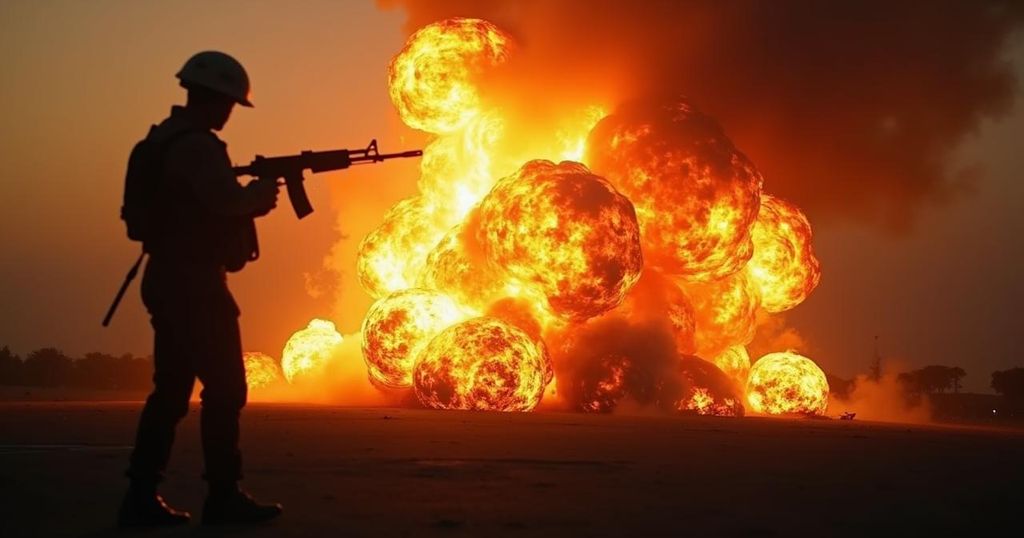Unraveling the Hezbollah Device Explosions: Key Questions and Concerns
In Lebanon, two incidents involving the explosion of pagers and radios have resulted in numerous casualties, prompting investigations focusing on potential Israeli involvement. The devices have been traced back to Taiwanese and Hungarian companies, raising alarms about the implications of intelligence operations and the dangers posed by compromised technology. The origins of the explosive devices remain shrouded in mystery, with ongoing inquiries into their use and the methods of detonation.
Following two catastrophic incidents in Lebanon where thousands of pagers and radios exploded, resulting in at least 37 fatalities and numerous injuries, investigations are ongoing to uncover the details of this alarming event. The blasts have been attributed to Hezbollah members’ communication systems, with the group pointing fingers at Israel, which has not yet issued a comment on the incidents. The BBC has traced the devices’ origins from Taiwan through Japan and Hungary back to Lebanon. A primary question arises: How were the pagers compromised? Initial hypotheses speculated on the possibility of a hacking incident. However, experts dismissed this notion, suggesting instead that the devices were likely rigged with explosives before reaching Hezbollah. The pagers were identified to contain the branding of a Taiwanese electronics firm, Gold Apollo, whose founder, Hsu Ching-Kuang, denied any involvement. Mr. Hsu mentioned that three years prior, he had licensed the trademark to Hungarian company BAC Consulting, which raised suspicions due to irregular payments traced back to the Middle East. Attempts to investigate BAC Consulting yielded limited results, as the company appeared to operate from a shared address in Budapest with no operational presence. Reportedly founded in 2022, BAC was described by Hungarian officials as a mere trading intermediary. Ms. Cristiana Bársony-Arcidiacono, BAC’s listed chief executive, claimed her role was limited to being an intermediary and also stated, “I don’t make the pagers. I am just the intermediate.” Concerningly, The New York Times has indicated that BAC may function as a front for Israeli intelligence, implicating that the actual manufacturers of the pagers reside within the Israeli intelligence community. Meanwhile, Bulgarian authorities have initiated an inquiry into a linked company amidst reports that 1.6 million euros associated with the device attacks transited through Bulgaria before reaching Hungary. With regards to the radio devices, which triggered in a subsequent wave of attacks, their origins remain unclear. Some exploded devices, models IC-V82 from ICOM, were reportedly purchased by Hezbollah months prior. ICOM maintains that the model has been out of production since 2014, positing that many of the devices responsible for the blasts may be counterfeit and highlighting the ease of acquiring similar variants online. Expert analyses of the damaged radios suggest they too might have been modified to detonate. Crucial questions linger regarding the method of detonation. Lebanese authorities concluded the devices were activated through “electronic messages” purportedly sent to them, which posed as correspondence from Hezbollah’s leadership moments before the explosions occurred. Individuals on the street described the chaos instigated by the detonations, adding to public panic, as many now fear that additional devices may similarly be compromised. Concerns in Lebanon have escalated, leading to the utilization of bomb disposal robots across streets to address potential threats posed by other technology. As tensions rise, theories about the timing of the attacks suggest that they could represent a calculated move by Israel, possibly in retaliation for previous conflicts or an urgent response due to a potential leak of information regarding the operation. Reports imply that these attacks might have been part of a broader strategy aimed at undermining Hezbollah’s capabilities. In conclusion, while questions abound regarding the operational methods employed in these explosions and the parties responsible, investigations continue to unfold, revealing a complex web of international connections and potential intelligence operations that exacerbate the precarious security situation in Lebanon and the surrounding region.
The recent explosions of communication devices in Lebanon have raised critical concerns about the security and functions of technology used by Hezbollah amid heightened tensions in the region. The incidents underscore the intersection of warfare, technology, and intelligence manipulation, as investigations indicate potential links to Israeli operatives. This context highlights the strategic implications of such operations and the potential for misinformation through compromised devices, necessitating clarity on both the origins of the explosive devices and the entities responsible for their deployment.
The explosions in Lebanon involving compromised communication devices raise significant questions about technological security and international intelligence operations. There is a pressing need to ascertain how these devices were rigged, particularly in light of claims suggesting involvement by Israeli intelligence through intermediary companies like BAC Consulting. The unfolding investigations not only aim to uncover this specific incident but also highlight wider implications for safety, surveillance, and conflict in the region. As authorities continue their inquiries, public anxieties regarding further compromised technology prevail, indicating a critical moment for both security and diplomatic relations in the area.
Original Source: www.bbc.com




Post Comment